- Home
- Anne Easter Smith
A Rose for the Crown Page 11
A Rose for the Crown Read online
Page 11
Without thinking of the embarrassment she might cause Richard and Elinor, Kate sat on one of the vacated stools and began coaxing notes from the strings. The boys were the first to notice, and they in turn tugged at their parents’ sleeves and made them take heed as well. Then Kate’s voice, soft at first as she found her way around the unfamiliar instrument and becoming stronger as the music carried her to a faraway place, floated through the room like ribbons of silk, caressing the ears of those who stopped to listen. Soon, a hush came over the room as the pure voice soared over heads and out into the great hall. Elinor had to be physically restrained by Richard from putting an end to Kate’s unseemly behavior. Richard and Anne, on the other hand, were smiling proudly at their cousin, who was obviously unaware of the admiring audience.
“’Tis Dickon, the king’s youngest brother,” Richard whispered to Anne, who was looking curiously at two boys sidling into the room.
“Which one?” Anne stood on tiptoe to whisper back, remembering Kate’s interest in the boy on London Bridge. Richard indicated the boy on the left, who was staring straight at Kate, a smile of pleasure curling his thin mouth.
Kate finished her song and looked up in surprise as the company applauded. She caught sight of the king’s brother and his friend and blushed to the roots of her hair.
At that moment, a man detached himself from the other guests and raised her from her stool. “God’s bones! ’Tis young Mistress Kate from Cheapside.” The dark brown eyes twinkled merrily at her. “And making a spectacle of herself again, I see. Soon you will be the talk of all London. Either they will call you Mistress Lackseat for falling off your horse or Mistress Angelica for your heavenly voice.”
“Master Howard! You remember me? I must thank you again for your kindness, sir. I am beholden to you.” Kate tried to sound like a lady. She curtsied awkwardly, still clutching the harp, making Howard smile. “I did not think to make a spectacle of myself. Truly, the music did carry me away. Did I do wrong?”
“Nay, Kate, you were enchanting!” Jack Howard chuckled, dispelling her fears.
The harper stepped forward to claim his harp and made Kate a sweeping bow. “My compliments, mistress.”
Richard and Anne were at her side by this time. Richard clasped Jack Howard’s arm warmly and introduced Anne, who bobbed a curtsy. Elinor chose to remain where she was. She was deep in conversation with Martin Haute and his wife, angry that Richard had chosen to leave her when she refused his arm. He had offered it instead to Anne, who had gladly left her pouting mother to her black humor.
While Richard and Howard exchanged pleasantries, Kate’s eyes searched the room for the royal visitor and his companion, but they had disappeared. Kate’s fantasy of actually meeting a member of the royal family quickly faded, and she sighed audibly.
Richard looked down at her. “Did you say something, Kate?”
“Nay, sir! ’Twas only a foolish idea—” She was cut short by a fanfare and a call to the guests to take their seats for the feasting.
Richard bowed formally to Howard and took his two charges back to Elinor.
“Greetings, ladies,” Martin said to the girls. “I pray you meet Philippa, my wife, and young George, our son. Philippa, here is Richard’s daughter, Anne, and our cousin, Kate Bywood.”
A tall, elegant woman with hair only a shade darker than her husband’s inclined her head and gave Richard her hand to kiss. She smiled at Richard and the girls.
“I am happy to know you. My husband told me of his visit to the Mote. He spoke of the two sweet girls he encountered there—Anne, Kate.” She bent to cup both girls’ chin at once, and her pale-blue eyes searched their faces. The girls murmured a greeting and curtsied.
Then they saw George. He was only two years older than they but a head taller. He had thick, blond hair that curled at the nape of his neck, and his eyes were iris-purple. The right mixture of both his handsome parents had created in him a young Greek god, as far as Kate and Anne were concerned, and they both instantly fell in love.
Elinor drew Anne forward, purposely blocking George’s view of Kate, and presented her daughter, almost pushing Anne into his arms. They recoiled at the same moment, and George’s bow and Anne’s curtsy were as formal as they could make them. Richard thwarted Elinor’s attempt to ignore Kate and presented her to George himself. The young man looked disdainfully at Kate and executed another bored bow. Kate, with the veil of love drawn across her eyes, saw only shyness and was attracted to him even more.
However, there was no more time for talking, most of the company had moved into the banqueting hall. The room was packed with guests, each taking his or her place below the big silver saltcellar at the king’s table. The silver spoons, goblets and flagons shimmered in the sunlight. On either side of Edward sat his brothers, and Kate was certain she was not imagining that he leaned more often to his brother Richard on his left than to his brother George on his other side. They were all too far away for her to see properly, but just knowing she was in the same room was exhilarating.
Jack Howard was seated not far from the king but a long way from the Haute family. Kate could see him when the large man across from her moved his bulk to the right to talk to his wife, and once Jack Howard caught her watching him and he gave her a broad wink. It amused him that she was so guileless and that instead of simpering and lowering her eyes, she grinned back at him. He turned his attention to his lady wife, Catherine, a handsome enough woman who had borne him six children. Jack Howard came from noble lines. His mother was the daughter of Lord Mowbray, duke of Norfolk, exiled during the reign of Richard the Second. His father was from a noted East Anglian family. His allegiance to Edward was sealed when he joined the new young king on his way to fight at bloody Towton field. Edward had knighted him after the battle and had lately appointed him sheriff of Norfolk and king’s carver. His star was most certainly in the ascendant, and this was not lost on some of Edward’s older servants—Richard Haute among them—who also hoped for favors.
Martin Haute’s family was seated farther from the salt than the Kent Hautes, but as they were on the other side of the long table from Kate, she was able to feast her eyes on George whenever she wanted. If he was aware of her gaze, he took great pains not to notice. Anne’s head was also turned in his direction for most of the feast, and despite the fabulous dishes served over several hours, both girls would be hard-pressed to recall what they ate that night. They were ecstatic when, before the day was over, they heard Elinor invite the young man to visit them at Ightham “in the very near future.” Martin thanked Elinor sincerely and promised he would send his son within the month. George looked less than enthusiastic, and Richard noticed that Philippa looked at him despairingly.
“There’s a young pup who needs a whipping,” he muttered, unaffected by George’s looks and unimpressed by his behavior, but his remark was drowned by the noise of several hundred people carrying on voluble discourse.
A trumpet fanfare split the air, and the chatter died instantly. The chancellor, George Neville, was on his feet. The Great Seal of England was his, and he wore his office with honor. “My lords, ladies, pray silence for His Grace, King Edward,” he cried.
All eyes turned to the table on the dais. Edward pushed his chair back and stood in one large but graceful motion. He had chosen royal purple for his belted short robe. The neck was trimmed with ermine, and its floor-length sleeves were slashed to show a gold silk undershirt. Edward hardly needed the fashionable padding around his chest and shoulders, and so the added bulk gave him the look of a Norse giant. On his lustrous hair was a simple gold crown set with a big amethyst. His fingers were covered with rings of every precious stone, and an elaborate gold collar hung from his shoulders. The gold and jewels on him sparkled in the bright light of the torches, tapers and candles, creating a heavenly aura. The guests waited for him to speak.
“My loyal subjects, my friends! I greet you well and you are right welcome at our table. Tonight I honor my family. My m
other, Cecily, duchess of York, to whom I give all obeisance and devotion!” He bowed low to Cecily, seated next to her youngest son, Richard. Proud Cis, as she was often called by those who had observed her haughty though not unkind manner over the years, smiled and bowed in return.
“My dearest sisters, Anne, Elizabeth and Margaret, God be with you all!” The young women smiled and blew him kisses. Edward grinned. “I warrant Margaret will expect me to find a royal bed for her now I am king!” he said behind his hand, and the company roared. The youngest of his sisters glared at him, her face flushed crimson.
He turned to his right and was more serious. “I give you my dear brother George, today named duke of Clarence, whose support and favor I shall count on in the years ahead.” Edward paused briefly to acknowledge George with a wave of his hand before turning from him to the small figure seated ramrod-straight on a large cushion placed on a high-back chair. “And now, my lords, I do present to you the newest and most faithful Knight of the Bath, my devoted brother Richard!”
He turned, put a brotherly arm around Richard’s shoulders and raised the boy to his feet, though being a small child for his age, the difference between Richard sitting and Richard standing was barely apparent. Richard smiled shyly up at his giant of a brother and chewed nervously on his lower lip. George, slighted by Edward’s cavalier attitude to him as the elder of the two boys, stood up as well—unbidden. Edward pretended not to notice and went on holding Richard. With his other hand, he raised his goblet. “À York!” he shouted triumphantly. The hall erupted with echoing shouts. “To York! God save the king!”
The hairs on Kate’s arms stood to attention. The excitement in the air traveled the length of the hall. A fanfare sounded. The people raised their cups and toasted the king, all hoping the new era would usher in peace.
A hammering was heard on the great oaken doors. The closest servants ran to heave them open, revealing a knight in full armor on a jet-black horse. The horse reared and then cantered into the now hushed hall. The horseman raised his visor.
“I am the king’s champion! I do hereby challenge anyone who says Edward be not our rightful king!” He cast his mailed gauntlet onto the flagstones.
Kate drew in a sharp breath. At her side, Richard laughed. “’Tis naught but a tradition, Kate, have no fear.”
The man swung right and left, his horse’s hoofs striking sparks from the floor, and waited for a response. The company held its breath. Surely no one here would challenge Edward’s right to be king. They were right. No one spoke. Gradually smiles and cheers took the place of anxious looks and silence. Edward rose grandly again and threw the rider a purse of gold.
“My thanks to you, knight. But I fear you shall have no sport this day. Pray take your beast outside and come join the festivities,” he shouted over roars of “God save the king.”
However, with Margaret of Anjou still roaming France seeking support for her royal husband, now prisoner in the Tower, and for her young son, Edward, once Prince of Wales, the present was still unpredictable for Edward of York, newly made king of England.
THE CELEBRATIONS LASTED three days. The king was crowned on a sunny Sunday morning at Westminster Abbey and again on Monday at St. Paul’s Cathedral.
Richard Haute was received by Edward following the ceremony in London’s huge cathedral along with other loyal followers of the new Yorkist regime. The king was gracious, Richard told his family, and had promised him a position at court when the right opportunity arose, then commanded him to return to Kent and “be mine eyes and ears in that region.”
Elinor was disappointed and took her resentment out on Kate at every turn. The very next day, she slapped Kate so hard that her fingers left a welt on Kate’s cheek. Richard questioned the girl about it, and she made up a story about tripping and falling against the bedpost, which Richard accepted grudgingly; he had too much on his mind to give it more thought. Anne held her breath throughout the encounter, marveling at Kate’s loyalty to Elinor and her ability to lie with such ease. She turned red for Kate and wrung her hands inside her apron pocket, a habit that often led her to break the stitching when the situation was particularly stressful. Kate pointed at the writhing pocket when Richard had left the room and giggled a little more nonchalantly than she felt.
“Why did you not tell him the truth, Kate. ’Twould have served mother right!”
Kate did not expect such anger from Anne. “Nay. Do you think she would thank me for it? By my troth, she would hit me harder.” Kate shrugged, the incident forgotten.
But Anne prayed earnestly for Kate’s state of grace that night, worried that her friend would be punished eternally for her lie, as Brother Francis had taught her.
As she lay on the pallet next to Anne and listened to Elinor and Richard snore in the big bed across the room, Kate’s thoughts were far from the fear of hellfire. She was thinking about George Haute. She felt a rushing sensation through her body as she pictured his handsome features and imagined touching his silky hair or—dare she think of it?—kissing his mouth. It made her shiver with pleasure. Someday, perhaps, she thought, hugging herself.
“Blessed Virgin, let him come to Ightham soon!”
NOT LONG AFTER King Edward’s coronation, George came to Ightham, and Kate lit a candle to the Virgin.
When George walked into the great hall, he was obviously impressed. His beautiful eyes swept over the room, taking in the rich tapestries, lofty vaulted ceiling and high-backed, elegantly carved chairs behind the solid oak table just below the embrasure to the privy chamber. Richard was having a fireplace built in the east wall, and already the mason had begun the intricate carvings around the five-foot-high opening.
Richard and Elinor graciously greeted George. Kate and Anne were ushered forward, and the three young people offered quick bows before Elinor shooed them off into the gardens to acquaint George with Ightham’s extensive acres.
He was pleasant enough in their company but did not seem to favor either girl at first. Later, however, he began to pay a great deal of attention to Anne, and Kate could not help but be jealous.
“Mistress Anne, may I say you have the grace of this lily?” George oozed one morning as the family was out walking through the gardens. He plucked a creamy flower and presented it to Anne with an exaggerated flourish.
Richard heard this remark with astonishment. True, his Anne was sweet and gentle, but to call her graceful was nothing short of false flattery. Kate, aye, he thought, but Anne? He had not been impressed by George at their first meeting in London, and now he began to suspect the youth was courting Anne for more than just her grace, as George had turned the conversation around to inheritances more than once. The first time, he had caught Richard off guard.
“’Tis a pity only boys can inherit property, Master Haute, is it not? Will Ightham pass to a nephew or a cousin?” George asked guilelessly. “I do not know your family.”
“But, George, there is no law against women inheriting property,” Richard responded innocently. “Where did you get that idea? My Anne is named in my will, and Ightham will one day be hers, in fact.”
Richard thought back to that conversation as their ramble continued and ground his teeth for falling into such a simple trap. Soon after that revelation, George had turned his full attention on Anne, and poor Anne was easy prey. Her eyes never left the boy’s face. She blushed every time he came into her presence, and she became tongue-tied when he addressed her. As a father, he knew not whether to scotch the relationship outright and risk breaking his child’s heart or grin and bear a son-in-law he was beginning to dislike. True, he liked the boy’s father well enough and knew Anne would not be averse, but . . . He could not put his finger on the anxiety he felt, so he resolved to talk to Elinor about it that night. For once, he could not fathom which way his wife’s mind was turning, but he knew she was watching the young couple as closely as he. In the end, a second son would not be good enough for his Anne, he knew.
At the same time, he co
uld not help but be amused by Kate’s antics to attract George’s attention. She dropped a kerchief in his path and batted her eyelids shamelessly at him when he picked it up and handed it back to her. She urged him to race her along the path by the stewpond and matched him stride for stride until the end, when she purposely let him win, pretending she was winded so that he must put his arm around her to support her. What a little minx! Richard chuckled. It must be killing her to see George fawn on Anne like this.
The final day of George’s visit was a day full of joy and sorrow for Kate, and she felt guilty for rejoicing that Richard and Elinor had turned George away without giving the young man hope of a betrothal with Anne. Her sorrow for Anne was matched only by her joy at George’s change of heart. Once George had found out which way the wind blew, he had lavished his good-byes on Kate, pressing her hand to his lips.
“Adieu, my fair Kate,” he whispered. “Until next time!” allowing the impressionable girl to believe he had been in love with her all along.
Anne had refused to be there to say farewell and was weeping in her chamber. Richard knew in his heart that he and Elinor had done the right thing and that George was naught but a weak boy with an eye to an inheritance, but it was hard to hear his daughter spill her sorrow out onto her bedcovers.
Handsome George had cantered off down the lane with nary a backward glance, and both girls’ hearts had gone with him that day.
6
Ightham, 1463
Geoff! Geoffrey! I know you are hiding here somewhere,” Kate called. She picked up her skirts and ran from tree to tree in the woods beside the upper lake. The stream that fed the lake was swollen after the night’s rain, and she chose not to cross it on the precarious stepping-stones. She ran along the edge, lifting her dress with one hand and holding her caul with the other to stop her unruly hair from flying out. She was so anxious to tell Geoff her news that she had not bothered to strap on her wooden pattens, and her leather shoes and wool stockings were wet and covered in mud. She knew she would be chastised by Elinor on her return but was too intent on finding Geoff to worry.

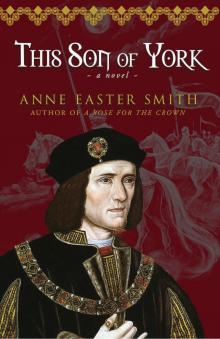 This Son of York
This Son of York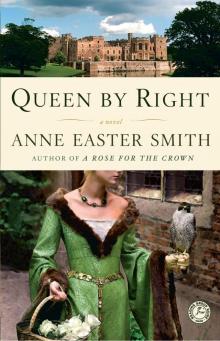 Queen By Right
Queen By Right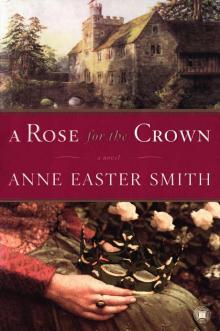 A Rose for the Crown: A Novel
A Rose for the Crown: A Novel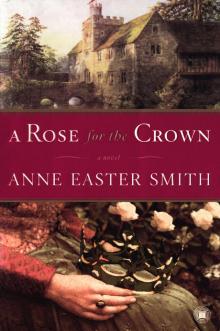 A Rose for the Crown
A Rose for the Crown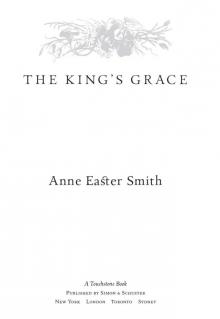 The King's Grace
The King's Grace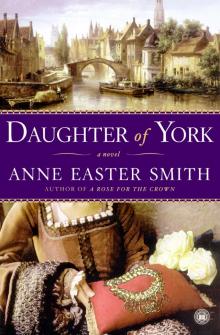 Daughter of York
Daughter of York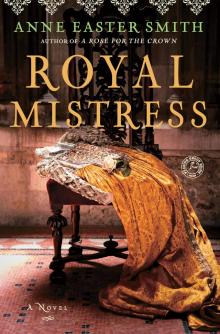 Royal Mistress
Royal Mistress